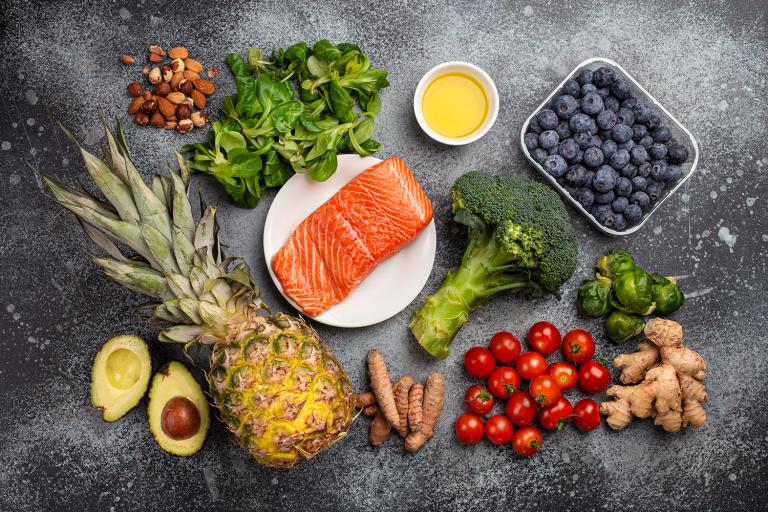Inflammation lies at the root of many chronic conditions and diseases, including pain, heart disease, diabetes, cancer, autoimmune disease, Alzheimer’s and other dementias.
While each of these conditions is complicated and multifaceted, warranting an individualized approach, we can often make major improvements in our health by adopting an anti-inflammatory lifestyle.
This reduces the risk of developing disease and can help manage pre-existing conditions.
Anti-Inflammatory Diet & Lifestyle
Every piece of food you put into your mouth has the potential to amp up or reduce inflammation in your body.
While the diet gurus debate diets ranging from paleo to vegan to Weston A. Price, you can take a wide-angle approach.
Balance your meals with produce (half your plate), protein, and a little bit of whole-food carbs at every meal.
Increase These Foods To Fight Inflammation:
- vegetables of all kinds
- some fruit (especially berries)
- wild, coldwater fatty fish
- salmon
- sardines
- herring
- mackerel
- nuts and seeds (especially sprouted)
- healthy fats
- avocados
- olive oil
- cooked mushrooms
- adequate hydration
- carbohydrates
- root vegetables
- winter squash
- in moderation:
- green or white tea
- red wine
- dark chocolate
Foods to Have in Moderation
- Beans and legumes (high-fiber complex carbs with protein)
- whole, gluten-free grains
- nightshade family vegetables
- potatoes
- tomatoes
- peppers
- eggplant
- if they agree with you:
- wild / pasture-raised animal products / dairy
- gluten-containing whole grains
- eggs
Foods to Limit or Avoid
In addition to anything you're allergic or sensitive to, be careful with:
- animal products
- in excess
- factory-farmed
- processed/packaged food
- high-glycemic food
- sugar
- white flour
- wheat
- most gluten-free flours
- most starches
- grilled food (especially meats and carbs)
- artificial anything
Lifestyle Changes
- Daily movement and exercise has profound effects.
- Don’t drink excessively or smoke.
- Aim to get seven to nine hours of sleep nightly.
- Mind-body balance is also helpful:
- stress reduction
- meditation
- deep breathing exercises
- yoga or t’ai chi
Anti-Inflammatory Supplements & Superfoods
Anti-inflammatory substances often work better together than they do as single-shot “miracle pills.”
As antioxidants, having a mix helps them refresh one another and target oxidative stress in different areas of the body.
Antioxidants also help turn on your body’s own antioxidant systems and promote a decrease of inflammation.
-
Turmeric Inhibits Inflammation
In one study of 367 people with knee osteoarthritis, 1,500 mg of turmeric extract daily for four weeks worked as well as 1,200 mg of ibuprofen with fewer gastrointestinal side effects.
Turmeric and its constituent curcumin inhibit inflammation via several pathways. Most attention has been given to the compound curcumin in turmeric, but other, noncurcumin constituents in turmeric also show anti-inflammatory benefits.
Various supplements and extracts exist on the market. Follow label directions or take 1⁄2 to 1 teaspoon or more of the dried powder per day in food, smoothies, or heated milk.
The powder blends well with fellow anti-inflammatory herbs: ginger, cinnamon, and a pinch of black pepper to increase bioavailability.
-
Green Tea: Anti-Inflammatory and Antioxidant Packed
All forms of the tea plant (Camellia sinensis) offer anti-inflammatory properties, but green and white tea tend to be the most antioxidant rich.
Both the whole tea and the compound epigallocatechin-3-gallate (EGCG) offer anti-inflammatory activity that targets cancer, obesity, cardiovascular disease, and neurodegenerative disease.
For even better inflammation and stress support as well as a flavor boost, consider combining green tea with holy basil (Ocimum sanctum, syn. O. tenuiflorum), also known as tulsi.
Aim for 16 to 32 ounces of tea daily; decaf offers some benefits. Although green tea extracts show great promise in studies, a handful of reports link them (but not the tea beverage) to liver toxicity.
-
Pure Berry Juice for a Anti-Inflammatory Punch
In general, fruit juice can promote inflammation because it contains so much sugar, even if it’s made with 100 percent juice. However, several antioxidant-rich juices offer less sugar and more anti-inflammatory punch. These include tart cherry juice, blueberry juice, pomegranate juice, and aronia berry juice.
Check the back ingredients label to ensure no filler juices like apple, pear, or grape have been added: Even all-natural brands can have misleading front labels.
Aim for 8 ounces morning and night, 1 ounce of juice concentrate, or an equivalent pill form.
-
Tart Cherry Juice
Tart cherry juice reduces exertion-induced inflammation and pain post-exercise and improves sleep.
-
Pomegranate Juice
Pomegranate offers benefits in rheumatoid arthritis, osteoarthritis, prostate and breast cancer prevention, and exercise-induced pain.
-
Aronia and Blueberry Juice
Consider aronia or blueberry juice for blood pressure reduction, vein health, and urinary tract infection prevention.
-

